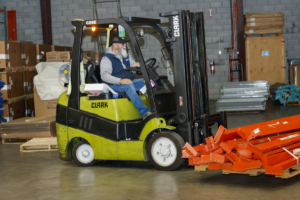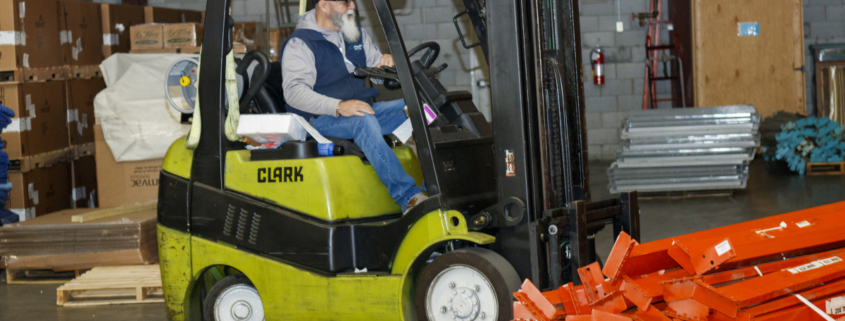What Items Are Movers Not Allowed to Transport?
 You’ve hired professional Greensboro movers, packed most of your boxes, and you’re ready for moving day. Then it hits you: can they actually move everything? The answer might surprise you. Professional moving companies have strict regulations about what they can and cannot transport, and these rules exist for very good reasons.
You’ve hired professional Greensboro movers, packed most of your boxes, and you’re ready for moving day. Then it hits you: can they actually move everything? The answer might surprise you. Professional moving companies have strict regulations about what they can and cannot transport, and these rules exist for very good reasons.
Understanding what items movers won’t take prevents last-minute surprises and helps you plan ahead. Let’s walk through the complete list of prohibited items and what you should do with them instead.
Why Do Moving Companies Have Restrictions?
Before we get into the specifics, it helps to understand why these restrictions exist. Moving companies aren’t just being difficult. They’re following federal and state regulations, protecting their employees, safeguarding your other belongings, and managing liability risks.
The U.S. Department of Transportation regulates interstate moves and prohibits certain items for safety reasons. Even local movers in Greensboro follow similar guidelines because these items pose real dangers during transportation. A single hazardous item could damage an entire truck full of belongings or put the moving crew at serious risk.
Insurance is another factor. Most moving company policies specifically exclude coverage for prohibited items. If something goes wrong with an item that shouldn’t have been on the truck in the first place, you won’t have any recourse.
Hazardous Materials Top the List
The most obvious category of prohibited items includes anything considered hazardous. These are materials that could explode, catch fire, or leak dangerous chemicals during transport.
Common hazardous items you probably have around your house include paint and paint thinners, motor oil and automotive fluids, propane tanks and fuel canisters, cleaning chemicals and solvents, nail polish remover and other acetone products, bleach and ammonia-based cleaners, pool chemicals, pesticides and herbicides, and aerosol cans.
That half-used can of paint in your garage? You’ll need to dispose of it properly at a hazardous waste facility or use it up before your move. The propane tank from your grill needs to be emptied and either left behind or transported in your personal vehicle according to safety guidelines.
Even seemingly harmless items like aerosol cans are prohibited because they can explode under pressure or in heat. This includes hairspray, spray paint, cooking sprays, and compressed air dusters.
Perishable Food Items
Professional movers won’t transport perishable food, and this makes sense when you think about it. Food that requires refrigeration can spoil during transport, especially if your move takes several days. Spoiled food attracts pests and creates odors that can permeate your other belongings.
This includes anything from your refrigerator and freezer, fresh produce, dairy products, and opened packages of food. Frozen items will thaw, meat will spoil, and you’ll end up with a mess nobody wants to deal with.
Plan to use up, give away, or dispose of perishable food before moving day. Non-perishable items in sealed containers are usually fine, but check with your moving company about their specific policies. Some movers prefer that food items travel separately even if they’re shelf-stable.
Plants (Sometimes)
This one catches many people off guard. While some local movers will transport plants, many won’t, and long-distance movers almost never do. Plants are living things that need specific conditions. They can be damaged by heat, cold, or lack of water during transport. They can also attract insects that might infest other items in the truck.
If you’re moving across state lines, there may be agricultural restrictions on transporting certain plants. Some states have strict regulations about bringing in plants that could carry pests or diseases.
Your best bet is to give plants to friends or neighbors, especially if you’re moving long distance. If you’re hiring local movers and moving nearby, ask about their plant policy. Some companies will transport plants if you pack them yourself and accept responsibility for any damage.
Valuables and Important Documents
Most moving companies won’t transport items of extraordinary value or irreplaceable documents. This includes jewelry and precious stones, cash and coin collections, stock certificates and bonds, medical records, legal documents, passports and birth certificates, family heirlooms with high sentimental value, and expensive electronics like laptops containing critical data.
This isn’t just about the moving company protecting themselves. It’s about protecting you. These items are too important to risk. Even with insurance, some things can’t truly be replaced.
Pack these items separately and transport them yourself. Keep important documents, jewelry, and valuable electronics with you during the move. Use a fireproof safe or folder for crucial papers, and never pack these items in the moving truck.
Firearms and Ammunition
Guns and ammunition require special handling and licensing to transport across state lines. Most moving companies won’t accept these items because of the complex regulations and liability involved.
If you own firearms, you’ll need to transport them yourself according to federal and state laws. Different states have different requirements for transporting guns, so research the laws for every state you’ll pass through. Ammunition should be stored in its original packaging and transported according to safety guidelines, always separate from the firearms themselves.
Living Things
No reputable moving company will transport pets or any other living creatures. This seems obvious, but it’s worth mentioning. Your dogs, cats, fish, reptiles, and any other pets need to travel with you or through a specialized pet transport service.
The same goes for things like ant farms or any other contained creatures. These need special care and attention that a moving company can’t provide.
Items That Don’t Belong to You
Movers can only transport items that belong to you. This means rental equipment, borrowed items, library books, and anything else you don’t own can’t go on the truck. Make sure you return everything before your move to avoid any issues.
Specialty Items That Need Special Handling
Some items aren’t necessarily prohibited, but they require special arrangements. These include pianos and organs, hot tubs and pool tables, safes weighing over 500 pounds, and large pieces of exercise equipment.
Your moving company can usually handle these items, but they need advance notice to bring appropriate equipment and staff. Don’t surprise your movers on moving day with a grand piano. These items often require additional fees because of the specialized equipment and extra crew members needed.
What Should You Do With Prohibited Items?
Now that you know what can’t go on the moving truck, what should you do with these items?
For hazardous materials, contact your local waste management facility about disposal options. Many communities have hazardous waste drop-off days where you can safely dispose of paint, chemicals, and other dangerous materials.
Perishable food should be used up, donated to neighbors, or thrown away in the days before your move. Plan your grocery shopping accordingly in the weeks leading up to moving day.
Valuables and important documents should travel with you in your personal vehicle. Pack a separate bag or box that stays with you throughout the move.
For items you can legally transport yourself, like propane tanks or ammunition, do your research. Understand the safety requirements and legal restrictions, and transport these items in your personal vehicle with proper precautions.
Communication Is Key to a Successful Move
The best way to avoid problems is to communicate clearly with your moving company from the start. When you get your initial estimate, ask about prohibited items. Be honest about what you own and what you’re planning to move.
Reputable Greensboro movers like Steele & Vaughn will walk you through their policies during the planning stages. They want you to be prepared just as much as you want a smooth move. As a member of the American Moving and Storage Association and the North Carolina Movers Association, they follow industry standards and regulations designed to keep everyone safe.
If you’re uncertain about a specific item, ask. It’s better to have that conversation early than to deal with complications on moving day. Professional movers have seen it all and can guide you on the best approach for handling unusual items.
The Key Takeaway
Understanding what items movers can’t transport helps you plan a smoother, safer move. These restrictions aren’t arbitrary. They protect you, protect the moving crew, and ensure your belongings arrive safely at your new home.
As you prepare for your move, make a separate list of prohibited items and plan how you’ll handle each one. Dispose of hazardous materials properly, use up perishable food, and keep valuables with you. The more prepared you are, the easier moving day will be.
If you’re planning a move in the Greensboro area and want professional guidance, Steele & Vaughn has the experience to help you navigate every aspect of your relocation. Our team understands the regulations and can help you prepare for a successful move. Contact us to discuss your moving needs and get answers to any questions about what we can and cannot transport. With proper planning and a professional moving company on your side, your move can be efficient, safe, and stress-free.




Leave a Reply
Want to join the discussion?Feel free to contribute!